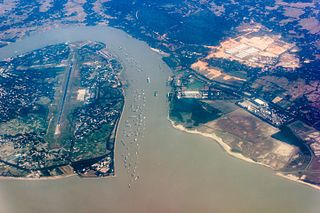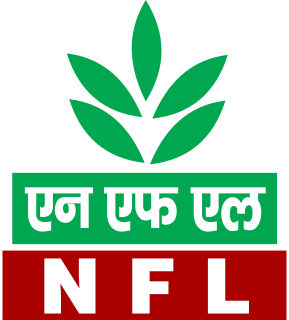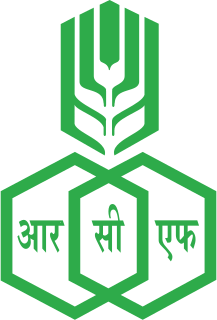Related Research Articles

Karnaphuli, or Khawthlangtuipui, is the largest and most important river in Chattogram and the Chattogram Hill Tracts. It is a 667-metre (2,188 ft) wide river in the south-eastern part of Bangladesh. Originating from the Saithah village of Mamit district in Mizoram, India, it flows 270 kilometres (170 mi) southwest through Chattogram Hill Tracts and Chattogram into the Bay of Bengal. Before the Padma, it was the fastest flowing river in Bangladesh. It is said to "represent the drainage system of the whole south-western part of Mizoram." Principal tributaries include the Kawrpui River or Thega River, Tuichawng River and Phairuang River. A large hydroelectric power plant using Karnaphuli river was built in the Kaptai region during the 1960s. The mouth of the river hosts the Port of Chattogram, the largest and busiest seaport of Bangladesh.

Petronet LNG Ltd is an Indian oil and gas company formed by the government of India to import liquefied natural gas (LNG) and set up LNG terminals in the country. It is a joint venture company promoted by the Gas Authority of India Limited (GAIL), Oil and Natural Gas Corporation Limited (ONGC), Indian Oil Corporation Limited (IOC) and Bharat Petroleum Corporation Limited (BPCL). Petronet LNG Limited, one of the companies in the Indian energy sector, has set up the country's first LNG receiving and regasification terminal in Dahej, Gujarat, and another terminal in Kochi, Kerala. While the Dahej terminal has a nominal capacity of 17.5 million tonnes per year, the Kochi terminal has a capacity of 5 million tonnes per year. Plans to build a third LNG terminal in Gangavaram, Andhra Pradesh were dropped in October 2019.

National Fertilizers Limited (NFL) is an Indian government-owned fertilizer producer that manufactures chemical fertilizers, organic fertilizers and industrial chemicals. As of 2018, it was the second largest producer of fertilizers in India. It is a Miniratna (Cat-1) company, with the Government of India owning a majority stake.

Hindustan Petroleum Corporation Limited (HPCL) is an Indian oil and gas refining company headquartered in Mumbai. Since 2018, ONGC has owned a majority stake in the company. The company is ranked 367th on the Fortune Global 500 list of the world's biggest corporations as of 2016. On 24 October 2019, the company became a Maharatna PSU.

Mangalore Chemicals & Fertilizers Limited is the largest manufacturer of chemical fertilizers in the state of Karnataka, India. The company is part of the Adventz Group. The company's corporate and registered office is at UB City, Bangalore and its factory unit is in Panambur, north of Mangalore.

Fauji Fertilizer Company Limited (FFC) is a Pakistani chemical company which produces chemical fertilizer. It was established by the Fauji Foundation which holds a controlling interest. FFC produces or markets various fertilizers which include urea, DAP, SOP, MOP, Boron and Zinc.
The incident of the 10-Truck Arms and Ammunition Haul took place in Chattogram, Bangladesh, on the night of 1 April 2004, when police and Coast Guard interrupted the loading of ten trucks and seized extensive illegal arms and ammunition at a jetty of Chittagong Urea Fertilizer Limited (CUFL) on the Karnaphuli River. This is believed to be the largest arms smuggling incident in the history of Bangladesh.

Rashtriya Chemicals & Fertilizers Ltd. (RCF) is an Indian public sector undertaking which produces chemical and fertilizers, based in Mumbai. RCF is fourth largest producer of fertilizers in India.

Bangladesh is an important tea-producing country. It is the 10th largest tea producer in the world. Its tea industry dates back to British rule, when the East India Company initiated the tea trade in the hills of the Sylhet region. In addition to that, tea cultivation was introduced to Greater Chittagong in 1840. Today, the country has 166 commercial tea estates, including many of the world's largest working plantations. The industry accounts for 3% of global tea production, and employs more than 4 million people.
Chittagong Urea Fertilizer School and College is a pre-primary, primary, secondary, and higher secondary school in Rangadia, Anwara Upazila, Chittagong District, Bangladesh. Located inside the colony of Chittagong Urea Fertilizer Limited, it was established in 1988 to educate the children and dependents of company employees. It is operated by Bangladesh Chemical Industries Corporation. It has about 40 teachers and 900 students.

Bangladesh Chemical Industries Corporation (BCIC) is a government owned corporation in Bangladesh.
Assam Petro-Chemicals Limited is a semi-governmental Indian company with major stakes held by Government of Assam, Oil India Limited and Assam Industrial Development Corporation (AIDC). The company was incorporated in 1971 and by 1976 had started production at their small methanol plant located at Namrup along with formaldehyde and a few urea-formaldehyde resins like urea-formaldehyde glue and urea-formaldehyde moulding powder. Post expansion in 1989 and 1998, the company expanded the methanol plant to the capacity of 100TPD and formaldehyde plant to 100TPD. The company announced in September 2017 that it would invest ₹1,337 crore (US$170 million) and expand to produce 500TPD methanol and 200TPD formalin and become the largest producer of methanol in India. The required feedstock for these plants are natural gas, urea and carbon dioxide. Natural gas, supplied by Oil India Ltd, is used as feedstock for methanol production. Urea and carbon dioxide are supplied by Namrup Fertilizer Plant.
Bakhrabad Gas Distribution Company Limited is a government owned major gas company in Bangladesh. It is under Petrobangla and is headquartered in Chapapur, Comilla.
Karnaphuli Gas Distribution Company Limited is a Bangladesh government owned major gas distribution company that is responsible for distributing gas in Chittagong District and the Chittagong Hill Tracts.
Karnafuli Fertiliser Company or KAFCO is a joint venture multinational company in located in Chittagong, Bangladesh that produces urea fertiliser from Natural Gas. It is located in Anwara upazila of Chittagong district by the side of the Karnafuli river occupying an area of 100.03 acres. Its shareholders include Government of Bangladesh, Bangladesh Chemical Industries Corporation (BCIC), and private sectors of Japan, Denmark and Netherlands. It is an export oriented factory and one of two major fertilizer factories in Bangladesh.
Triple Super Phosphate Complex Limited or TSP Complex Limited is a government owned fertilizer company in Bangladesh. It is under supervision of Bangladesh Chemical Industries Corporation (BCIC). It primarily produces phosphate fertilizers. The factory complex consists of 2 units of TSP fertilizer producing facility with installed capacity of 1,52,000 MT.
Jamuna Fertilizer Company Limited is a Bangladesh government owned fertilizer company based in Jamalpur District. It was under the Bangladesh Chemical Industries Corporation of the Ministry of Industries. Khan Javed Anwar is the Managing Director of Jamuna Fertilizer Company Limited. It is one of the largest fertilizer factories in Bangladesh.
Ashuganj Fertilizer and Chemical Company Limited is a Bangladesh government owned company fertilizer company. It is under the Bangladesh Chemical Industries Corporation of the Ministry of Industries. Ashuganj Sar Karkhana College is college affiliated with the company.
Shah Md. Imdadul Haque is a Bangladeshi civil servant and Chairman of the Bangladesh Chemical Industries Corporation. He is the chairman of Synovia Pharma PLC, which is owned by BEXIMCO Group. He is the chairman of Saudi Bangla Integrated Cement Company Limited. He is the chairman of Usmania Glass Sheet Factory Limited. He is a director of Jamuna Fertilizer Company Limited. He is the Chairman of Training Institute for Chemical Industries. He is the chairman of Karnaphuli Fertilizer Company Limited. He is a former Chief Executive Officer of the Dhaka South City Corporation.
References
- ↑ "Chittagong-Urea-Fertilizer-Ltd". bcic.gov.bd. Retrieved 25 December 2018.
- 1 2 "Industries get new life for LNG". New Age. Retrieved 25 December 2018.
- ↑ Patel, Surendra J. (2018). Technological Transformation in the Third World: Volume 1: Asia. Routledge. ISBN 9781351110051 . Retrieved 25 December 2018.
- 1 2 "Chittagong Urea Fertiliser Ltd goes on overhauling". observerbd.com. Retrieved 25 December 2018.
- ↑ "Production at Ctg Urea Fertilizer Factory resumes". theindependentbd.com. Retrieved 25 December 2018.
- ↑ "CUFL, Jamuna fertilizer to start production next month". Daily Sun. Retrieved 25 December 2018.
- ↑ "Karnaphuli pollution proves fatal for marine fisheries in Bay". bdnews24.com. Retrieved 25 December 2018.
- ↑ "Arms, ammo made in China". The Daily Star. 8 April 2013. Retrieved 25 December 2018.
- ↑ "Babar prevented DGFI probe". The Daily Star. 16 March 2012. Retrieved 25 December 2018.
- ↑ Mahanta, Nani Gopal (2013). Confronting the State: ULFA's Quest for Sovereignty. SAGE Publications India. p. 241. ISBN 9788132113270.
- ↑ Raghavan, V. R. (2013). Internal Conflicts- A Four State Analysis: India-Nepal-Sri Lanka-Myanmar. Vij Books India Pvt Ltd. p. 85. ISBN 9789382573418.